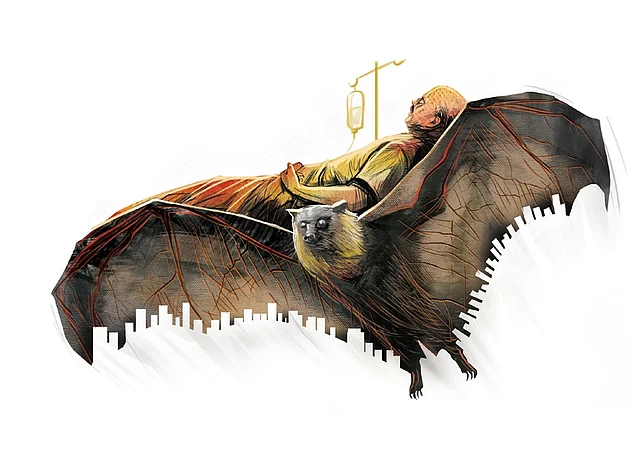Science
New Antibody Test Unveils Hidden Nipah Virus Transmission Pathways

A new sero-surveillance initiative launched in Kerala aims to uncover the hidden transmission pathways of the Nipah virus, which has caused recurrent outbreaks in the region. Central to this effort is a novel testing kit developed by the Institute of Advanced Virology (IAV). This kit detects Nipah antibodies in both humans and animals, offering a broader understanding of how the virus may be transmitted.
As the origin of transmission from bats to humans remains unclear, this initiative focuses on identifying potential intermediate animal hosts through blood samples. The IAV kit employs pseudovirion technology, allowing it to detect antibodies across multiple species without the need for separate testing kits. Dr. Easwaran Sreekumar, director of the IAV, highlighted the importance of this development, stating, “Traditional studies are limited because the virus often isn’t detectable in blood, and handling it typically requires a BSL-4 lab. This new assay system gives us a way forward.”
Breakthrough in Testing Capability
The new testing process does not require a biosafety level 4 (BSL-4) laboratory, a significant advantage given that Kerala currently lacks such facilities. The kit was first validated using blood samples collected in 2023 from individuals infected with Nipah in Malappuram. It has since been employed to test domestic animals across the Palakkad and Malappuram districts, marking a significant expansion in surveillance efforts.
Samples collected from domestic animals, including cats, dogs, and cattle, are now being sent for testing. Dr. Sanjay Devarajan, a disease investigation officer at the State Institute of Animal Diseases, noted that animals within a 1-kilometer radius of Nipah cases are being closely monitored. “Detection of antibodies in domestic animals can play a major role in shaping future Nipah prevention policies,” he said.
Implications for Public Health
The implications of this new antibody testing system extend beyond immediate animal health concerns. According to Dr. T S Anish, a professor and nodal officer at the Kerala One Health Centre for Nipah Research and Resilience, it can help answer pivotal questions about which animals act as reservoirs for the virus and how it jumps to humans. He emphasized that stored blood samples could still be tested with this new system, thereby enhancing the understanding of past outbreaks.
Despite its advantages, Dr. Anish cautioned that the new testing method should not replace PCR testing, which remains essential for detecting active infections. As testing of human samples is set to begin soon, the IAV’s initiative represents a critical step in understanding and controlling the Nipah virus, potentially mitigating future outbreaks.
In conclusion, the IAV’s innovative approach and collaboration with local health authorities may provide the tools needed to monitor and prevent the transmission of this dangerous virus. The ongoing efforts to identify hidden pathways could ultimately safeguard public health in Kerala and beyond.
-

 World4 months ago
World4 months agoSBI Announces QIP Floor Price at ₹811.05 Per Share
-

 Lifestyle4 months ago
Lifestyle4 months agoCept Unveils ₹3.1 Crore Urban Mobility Plan for Sustainable Growth
-

 Science3 months ago
Science3 months agoNew Blood Group Discovered in South Indian Woman at Rotary Centre
-

 World4 months ago
World4 months agoTorrential Rains Cause Flash Flooding in New York and New Jersey
-

 Sports3 months ago
Sports3 months agoBroad Advocates for Bowling Change Ahead of Final Test Against India
-

 Top Stories4 months ago
Top Stories4 months agoKonkani Cultural Organisation to Host Pearl Jubilee in Abu Dhabi
-

 Science4 months ago
Science4 months agoNothing Headphone 1 Review: A Bold Contender in Audio Design
-

 Top Stories4 months ago
Top Stories4 months agoAir India Crash Investigation Highlights Boeing Fuel Switch Concerns
-

 Sports3 months ago
Sports3 months agoCristian Totti Retires at 19: Pressure of Fame Takes Toll
-

 Business4 months ago
Business4 months agoIndian Stock Market Rebounds: Sensex and Nifty Rise After Four-Day Decline
-

 Politics4 months ago
Politics4 months agoAbandoned Doberman Finds New Home After Journey to Prague
-

 Top Stories4 months ago
Top Stories4 months agoPatna Bank Manager Abhishek Varun Found Dead in Well









